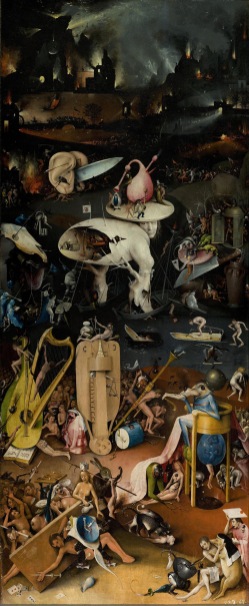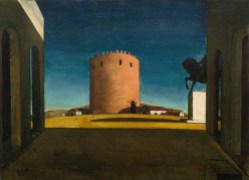At the heart of every story lies a universal theme: good versus evil. The way it manifests may vary greatly, but it will be present in its many forms across all genres of fiction. To achieve the happy ending, our heroes must conquer the evil. In the tragedy, it is the evil that does the conquering. Even in humorous writing, there will be some sort of obstacle to overcome (evil) despite the comedy playing out on the pages. And because it is even present in such ‘happy’ stories, we call it conflict instead of good versus evil.
This ability to conceive the idea of evil –of suffering– is unique to human beings. Cattle, for example, don’t think ahead of time about what they will encounter upon entering the slaughterhouse. Everyone, every single one of us that has ever lived has experienced suffering and evil. Why then, are we drawn to it in our books, music and art? Because let’s be honest, we are drawn to it. Even when there isn’t a positive outcome vis-a-vis the hero vanquishing the villain, the happily-ever-after romance, the underdog team winning the game at the buzzer. Think Greek tragedy, Shakespeare, Sylvia Plath.
In music, an entire genre –The Blues– arose from the experience of African American slaves in the Deep South.

Some of the greatest individual works of art as well as whole artistic movements are heavy with dread: Hieronymus Bosch, for example; Georgio de Chirico, Edward Munch, and Kay Sage are others.
For the writer, composer or artist, their art itself can be a coping mechanism. The especially gifted will tell you they are compelled to create. Without this release of creativity, they would go mad. Some ‘go mad’ anyway –the inability to manage the melancholy, the internal (or external/physical suffering) then leads to self destruction– while others are able to harness the dread and put it back in its cage when they’ve made use of it.
When we the observer, are drawn to this outlet for pain, on some level we recognize the dread lurking within. “That,” we say, “is how I feel.” “This happened to me.” “I am hurting, confused, scared, angry, desperate, lonely too.” Whatever the medium, we see in it, a mirror of our own experience. So because conflict and suffering IS the common experience of all mankind, artistic expression of that experience resonates strongly with every one of us. Art isn’t always pretty, but it is successful if it makes you feel something.









Exactly. Sophie’s Choice was one of the most depressing films I’d ever seen, yet it had a profound impact on me. Listening to leadbelly, as flawed as the recording techniques, is much more visceral to me than 90% of the produced bands today. Even when evil triumphs over good works if it’s done right. Rosemary’s Baby is one of those films. I was taught in music that people ought to either love or hate your music. It’s about the reaction. If people are ambivalent about my work, then I’ve failed.
LikeLiked by 1 person
Yes! That is exactly right. It’s been true for me as well. Some of the best books I’ve read are the ones with the darkest themes. I don’t always read to be uplifted but to be moved to tears. Thanks, Rob. You said it perfectly!
LikeLike
That last sentence says it all. 😊
LikeLiked by 1 person
Thanks! Yep. That is the summation of it all!
LikeLiked by 1 person
Eye of the beholder. 😊
LikeLiked by 1 person
Yes, definitely. And sometimes stirring the negative emotions proves cathartic. Like when a sad song makes you cry. You feel better afterward.
LikeLiked by 1 person
Yeah, we can all relate to the darker side of art. And like you said, some of the greatest artists or writers or musicians are some of the most tormented souls. It’s an awful reality, but angst and heartbreak are terrific muse. 😏
LikeLiked by 1 person
You’re right. I think the negative emotions must work differently on our psyche. I should look that up… Because I think that’s true but I don’t know why or how!
LikeLiked by 1 person
You’re probably right. I’m sure negative input causes a certain response, both hormonally and emotionally. It’s definitely physiological in nature. Would be a great topic for a psych major’s thesis. 😃
LikeLiked by 1 person
Ooh, I feel myself falling down the rabbit hole of research!
LikeLiked by 1 person
Uh oh. New can of worms opening? 😃😃
LikeLiked by 1 person
Maybe… I need to focus on one thing at a time! Lol!
LikeLiked by 1 person
Nah. If you’re like me, we can handle numerous thi…..hey look, a chicken!
LikeLiked by 1 person
Hahahaha! Yep!
LikeLiked by 1 person
😏😏
LikeLiked by 1 person
Aijoseizonsuki – To enjoy being sad!
There’s a word for everything!
LikeLiked by 1 person
No kidding! That’s good to know, thank you for that!
LikeLiked by 1 person
Yet somehow, though I don’t think sad or tragic stories aren’t equally as good… they are… But I don’t usually like them. I think I need the happy ending. Not that I don’t enjoy really dark stories… but I still need something ‘good’ at the end or it leaves me feeling terrible. I realize, of course, that this has to do with me not the work of the artist. If I feel terrible, they’ve done their job well. I just hate to end up feeling that way. Probably because that’s how I feel most of the time… that things are not going well and won’t end well…
Sad songs or even poetry are totally a different story for me, though.
LikeLiked by 1 person
I’m with you on the stories… I’ve read a few books where I’ve said “it’s the best book I’ll never read again” because the ending was so depressing. I really want the happy ending too – no matter how grim things become along the way! Art, music and poetry must hit a different spot in our hearts/minds because I am completely drawn to the darker, bleaker pieces. But without being left with that hopeless feeling afterwards. I really would be interested in finding out more about it from a psychological perspective! (Like I need more distractions!)
LikeLiked by 1 person
Haha! I’m pretty sure my psychological analysis would tell me I want a happy ending because I don’t have one now… because I’m too damn sad in general. Not sure why music, etc., is different, though.
LikeLiked by 1 person
Maybe the fact that we place ourselves in the character’s position. It’s a little harder to do that with poetry, music and art. It’s not as straightforward. I wish a happy ending for you! ❤️
LikeLiked by 1 person
Thanks ♥
LikeLiked by 1 person
Oh I love this!
LikeLiked by 1 person
Thanks, Rita!
LikeLiked by 1 person
❤️
LikeLiked by 1 person
Beautiful, and so true.
LikeLiked by 1 person
Thank you… Aren’t we strange creatures, being lured by the sad and grim?
LikeLike
I just finished Every Note Played by Lisa Genova (Still Alice) and I almost didn’t read it. It deals with ALS and even though the ending is a type of closure, there’s no real happiness. Yet it was fascinating to me once I got into it. And I admit I cried, because although it was fiction it could have been someone’s life.
LikeLiked by 1 person
Oh yes… I said to Sandra I have read some amazing books that just made me weep. Excellent storytelling but hard on the heart! 💔😰
LikeLiked by 1 person
Very perceptive writing, Meg.
LikeLiked by 1 person
Thanks, Vinnie!
LikeLiked by 1 person
My pleasure.
LikeLiked by 1 person
A god read, Meg. Thank you. Enlightening too. Words I can handle, and paintings, but not films. There’s something about the movie theatre that creeps me up. Maybe it’s the British spelling. There are many films that I just cannot watch.
LikeLiked by 1 person
I have seen a few films I’d rather forget as well. Not because they were bad films, but because they were so depressing. With paintings, I think there is much we interpret for ourselves so that may relieve the dread somewhat. Thank you, Roger.
LikeLiked by 1 person
The mutual care society: thank you too, Meg. Between us, we may even change the wold view of one or two people.
LikeLiked by 1 person
Oof. A good read and spot on, Meg.
Sharing in each other’s dread is prolly why Brits like talking about the weather so much…
LikeLiked by 1 person
Haha! We do it too. And yes, dread is common to us all! Thank you!
LikeLike
I agree that art does wonders for people and takes away from suffering. It brings an odd sort of understanding as we can look a piece (play or listen to a tune, etc.) and feel that the artist understands us and gets what we are experiencing, even though our thoughts may have nothing to do with the intent behind a song or painting.
Even in writing, what the reader reads and gets from our stories is as vital as what caused us to write. Perhaps that’s why Winston Churchill is said to have said that cutting the budget to the arts in WWII was wrong, because they were what the allies were fighting for. I looked up the quote, and there is no consensus if he said this or in what words, but nevertheless, the quote has great meaning.
As for good and evil, and the complicated battle of it within and outside us, I always go back to a John Donne quote from his poetry “Satire III.” It’s a hidden line within the poem, but a theme throughout Renaissance poetry and literature. “ . . .[T]hough truth and falsehood be near twins, yet truth a little elder is.” Thus, as Donne and Milton too believed in ‘Paradise Lost’,’ good existed in this world first, not evil. This is why in the end, good will prevail. It has knowledge and a ‘truth’ that evil or falsehood will never have.
Another long comment, sorry. Have a wonderful weekend Meg 🙂
LikeLiked by 1 person
I love that quote as well – even if Churchill didn’t say it, it is an excellent point. And the Donne lines too. Thank you for sharing that, I had not heard that one before. Have a wonderful weekend too! 💖
LikeLiked by 1 person
Thanks you too Meg 🙂
LikeLiked by 1 person